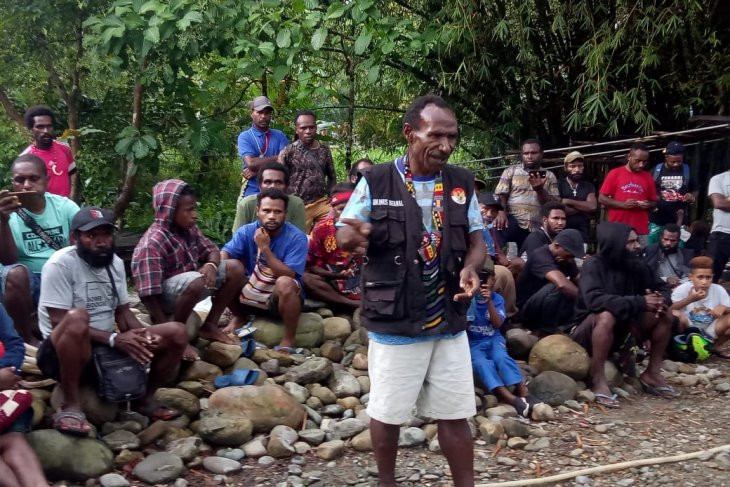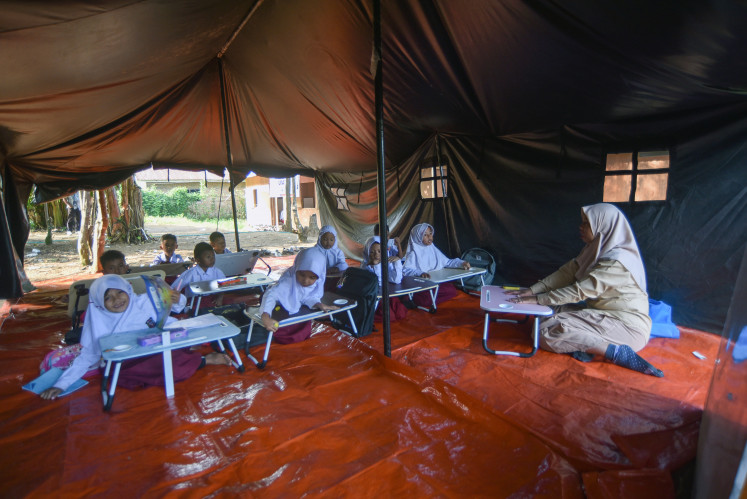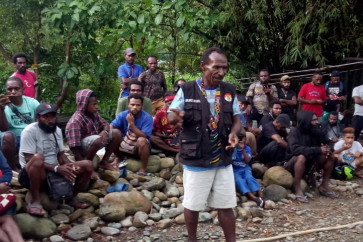Popular Reads
Top Results
Can't find what you're looking for?
View all search resultsPopular Reads
Top Results
Can't find what you're looking for?
View all search resultsSelective welfare and the impromptu humanitarian pause in Papua
The majority of indigenous Papuans live in highlands and mountainous areas and barely reap the benefits of economic growth.
Change text size
Gift Premium Articles
to Anyone
 Safe haven: Community figure Kolinus Beanal (center) and people of Banti hamlet in Tembagapura district, Papua, gather near their shelter in Timika on Oct. 29, 2020. About 1,800 residents of Banti, Kimbeli and Opitawak hamlets sought refuge in Timika in March 2020 to evade armed conflict between security forces and rebel groups. (Antara/Evarianus Supar)
Safe haven: Community figure Kolinus Beanal (center) and people of Banti hamlet in Tembagapura district, Papua, gather near their shelter in Timika on Oct. 29, 2020. About 1,800 residents of Banti, Kimbeli and Opitawak hamlets sought refuge in Timika in March 2020 to evade armed conflict between security forces and rebel groups. (Antara/Evarianus Supar)
I
n late 2022, two important issues received wide attention in Papua: the creation of four new provinces there and the initiative of a humanitarian pause to deescalate violence related to armed conflict in the land.
Despite resistance from various elements in Papua, the central government and the House of Representatives revised the 2001 autonomy law, adding four more provinces in Papua: South Papua, Central Papua, the Papua Highlands and Southwest Papua. These new provincial administrations aim to boost regional welfare and resolve the long-running conflict in Papua. They are projected to be economic centers that employ a culture-driven development model following the 2020-2024 National Medium-term Development Plan (RPJMN).
However, the stakeholders at the national and regional levels must consider a few crucial things for these new provinces: protecting indigenous rights, including lands and surrounding environments, and strengthening the fisheries and farming sectors, which most indigenous Papuans rely on for their livelihoods.
Positive regional economic growth in Papua also provided a pretext for the formation of the four new provinces. In the second quarter of 2022, Papua and West Papua recorded growth of 14.38 percent and 6.07 percent, respectively, well above the national rate of 5.44 percent. Three leading sectors of transportation, logistics and storage have contributed to this local economic growth.
This is thanks to the current administration’s sea toll road that connects outer islands and boosts activities in those three sectors in Papua. In the past three years, service-based industry has been a prominent contributor to Papua’s economy, along with the mining, oil and gas sectors, which have long dominated its economic structure. Four cities with declining numbers of indigenous Papuans, namely Merauke, Timika, Jayapura and Manokwari, will still be the economic centers in Papua.
Despite this significant economic achievement, Papua is still the country’s poorest region. The regional economy, which mostly relies on services and extractive industries, does not reflect indigenous Papuans’ real economic conditions, which chiefly depend on agricultural and fisheries livelihoods.


















